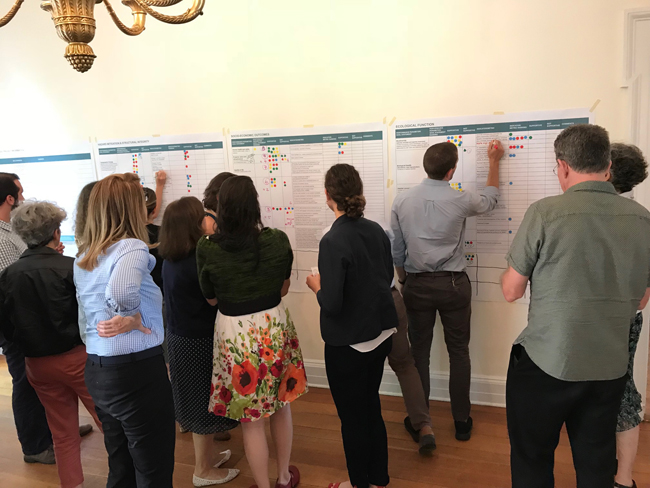NYSG and partners are developing a framework to monitor and assess the function of natural and nature-based shorelines structures
Contacts:
Helen Cheng, NYSG Coastal Resilience Extension Specialist, P: 718-951-5415, E: helen.cheng@cornell.edu
Kathleen Fallon, NYSG Coastal Processes & Hazards Specialist, P: 631-632-8730, E: kmf228@cornell.edu
Roy Widrig, NYSG Great Lakes Coastal Processes & Hazards Specialist, P: 315-312-3042, E: rlw294@cornell.edu
Brooklyn, NY, March 4, 2019 - Extreme weather, sea level rise, Great Lakes’ storms and the resultant shoreline erosion demand innovative solutions for protecting New York’s shorelines, property, people, and ecology. Nature-based solutions may be possible, but awareness and data regarding their efficacy is limited.
Interest in utilizing innovative shoreline management has grown throughout New York State (NYS) as an alternative to hard structural features. Natural and nature-based features might limit negative impacts on shoreline processes and provide ecological and community benefits. However, there is limited evaluation data available or being collected on the performance of various protocols for gathering such data.
Since 2017, New York Sea Grant (NYSG) has been part of a statewide effort to develop monitoring protocols that track the performance of shoreline types throughout NYS. NYSG Extension specialists serve as regional leads for the New York City, Long Island, and Great Lakes regions, providing workshop design, facilitating local workshops, and soliciting feedback from the respective regions.
In 2018, a shoreline monitoring framework draft was developed and is being tested as a way to help stakeholders better understand the ecological services, hazard mitigation and community well-being contributions that natural, nature-based and structural features provide.
NYSG organized three of four regional workshops attracting more than 80 participants, including experts from federal, state, and local agencies; homeowner associations; and non-government organizations shared experiences with shoreline management and best practices. Most importantly, attendees provided recommendations to refine the monitoring framework to ensure applicability to specific regions.
Work continues in 2019 as NYSG, partners, and stakeholders foster relationships with regional practitioners to develop this statewide monitoring framework aimed at addressing ecological function, hazard mitigation, and socio-economic outcomes.

Participants at a regional workshop provide suggestions and feedback on monitoring framework. Credit: SCAPE/Hannah Davis.
Partners:
• Science and Resilience Institute at Jamaica Bay
• Arcadis Design and Consultancy
• Consensus Building Institute
• City University of New York
• New York City Department of Parks and Recreation
• New York-New Jersey Harbor Estuary Program
• New York State Dept. of Environmental Conservation
• SCAPE Landscape Architecture
• U.S. Forest Service: NYC Urban Field Station
• New York State Department of State
• New York State Energy and Research Development Authority
More Info: New York Sea Grant
New York Sea Grant (NYSG), a cooperative program of Cornell University
and the State University of New York (SUNY), is one of 33 university-based
programs under the National Oceanic and Atmospheric Administration’s
National Sea Grant College Program.
Since 1971, NYSG has represented a statewide network of integrated
research, education and extension services promoting coastal community
economic vitality, environmental sustainability and citizen awareness
and understanding about the State’s marine and Great Lakes resources.
Through NYSG’s efforts, the combined talents of university scientists
and extension specialists help develop and transfer science-based
information to many coastal user groups—businesses and industries,
federal, state and local government decision-makers and agency managers,
educators, the media and the interested public.
The program maintains Great Lakes offices at Cornell University, SUNY
Buffalo, SUNY Oswego and the Wayne County Cooperative Extension office
in Newark. In the State's marine waters, NYSG has offices at Stony Brook
University in Long Island, Brooklyn College and Cornell Cooperative
Extension in NYC and Kingston in the Hudson Valley.
For updates on Sea Grant activities: www.nyseagrant.org has RSS, Facebook, Twitter, and YouTube links. NYSG offers a free e-list sign up via www.nyseagrant.org/nycoastlines for its flagship publication, NY Coastlines/Currents, which is published quarterly. Our program also produces an occasional e-newsletter,"NOAA Sea Grant's Social Media Review," via its blog, www.nyseagrant.org/blog.